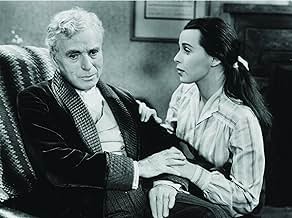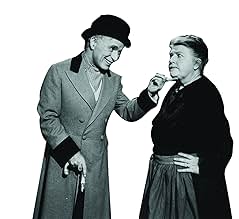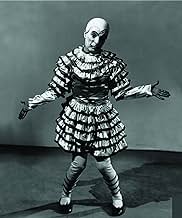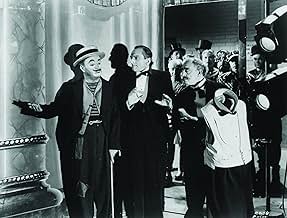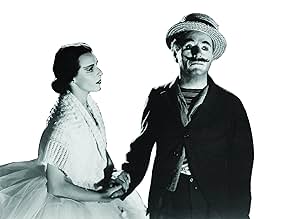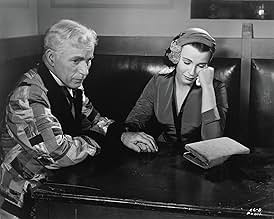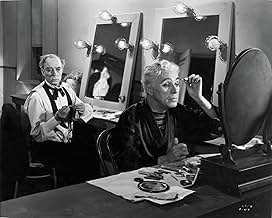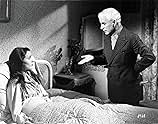IMDb रेटिंग
8.0/10
23 हज़ार
आपकी रेटिंग
अपनी भाषा में प्लॉट जोड़ेंA fading comedian and a suicidally despondent ballet dancer must look to each other to find purpose and hope in their lives.A fading comedian and a suicidally despondent ballet dancer must look to each other to find purpose and hope in their lives.A fading comedian and a suicidally despondent ballet dancer must look to each other to find purpose and hope in their lives.
- 1 ऑस्कर जीते
- 7 जीत और कुल 4 नामांकन
Molly Glessing
- Maid
- (as Mollie Glessing)
Leonard Mudie
- Dr. Blake - Calvero's Doctor
- (as Leonard Mudi)
'Snub' Pollard
- Street Musician
- (as Snub Pollard)
Billy Lee Aimone
- Little Boy
- (बिना क्रेडिट के)
फ़ीचर्ड समीक्षाएं
Haunting and unforgettable piece from Charles Chaplin that was nearly lost in the American cinema all together. It played in very few cities within the U.S. in 1952 and was never shown in Los Angeles due to the suspicion that the House of Un-American Acts Committee had concerning Chaplin (making no sense to me as Chaplin, who was British, was the polar opposite of a Communist from all indications). The film disappeared from U.S. soil and did not re-surface until some 20 years later in 1972 and Chaplin actually won an Oscar, with fellow scorers Raymond Rasch and Larry Russell, for this movie's original dramatic score (this was the only competitive Oscar Chaplin ever won). Chaplin stars as a washed-up vaudeville performer. He is now an elderly man (in his 60s when the film was made) and the spotlight is gone forever, even though he still secretly yearns for it. Chaplin discovers a very young ballet dancer (Claire Bloom) who has attempted suicide because she cannot handle being a performer. Naturally Chaplin cannot believe that this young, beautiful and talented woman would rather take her life than be a ballet performer (the fact that Chaplin yearns for her youth and the ability to be an entertainer again makes him bound and determined to get her back on her feet). He tries with all his might to get her performance-ready again, all the while he is also trying to resurrect the career that he lost long ago. Chaplin has a dream of a stunning performance he has on the stage, but when his act ends there is no one there to acknowledge him (one of, if not the saddest sequences I have ever seen on film). Soon it becomes obvious that Chaplin's time is running out and his desperation to have that one last piece of action engulfs his mind, body, heart and soul. "Limelight" is one of the most dramatic and intense pictures I have ever encountered. Chaplin's life and career had changed dramatically by 1952. The Little Tramp was no more, all movies had sound, some films were being made in color and the subject matter of motion pictures was slowly starting to change. In many ways Chaplin was trying to show the viewing public his life in celluloid form and "Limelight" would be the vehicle used. This is a stunning work that once again shows the humanity and overall sensitivity that Chaplin had with his movies. Chaplin's long-time rival in real-life (Buster Keaton) even shows up late and acts as a partner in the duo's stage routine. The pairing is usually the most memorable part of this production to most, but the story and the deep emotional part that Chaplin plays are the things that make "Limelight" quite possibly Chaplin's greatest cinematic masterpiece. 5 stars out of 5.
Charles Chaplin plays Calvero, an aging clown who rescues a ballet dancer called Terry (Claire Bloom) from committing suicide.These two become friends and Calvero gets more meaning to his life.He desperately tries to make a come back to become the greatest clown again but it's hard to make people laugh anymore.Limelight from 1952 was Charles Chaplin's last American film.It was a flop but the film won an Academy Award for best score in 1972.That year the king of comedy got also a special Oscar for career achievement.This was Chaplin's most sentimental movie and it also was very touching.Chaplin is amazing as the aging clown.The man wasn't only a great comedian.He was also a terrific actor.It's hard to top his performance in this movie.Claire Bloom's performance as the ballet dancer is also brilliant.Chaplin's son Sydney plays Neville in the movie.There are also Chaplin's children Victoria, Michael, Josephine, Geraldine and Charles Chaplin Jr. in this film.This is truly a masterpiece.This proves that Chaplin didn't shine only in silent movies.He did that also in talkies.And this is one of his best talkies. The dialogue is just delicious in this comedic drama.In the end you can see another great comedian from the silent era;Buster Keaton.You can see Chaplin and Keaton clowning together in the end.And that is one great scene.A scene to remember.The message of Limelight is how wonderful life is.Enjoy it while you still can.
Charles Chaplin stars as Calvero, an alcoholic, washed-up music hall comedian who saves a rooming house neighbor from committing suicide when he passes by her door and smells gas. The neighbor, young ballet dancer Thereza (Claire Bloom), attempted suicide because she believes that she will never walk and therefore never dance again. She stays with Calvero while she recuperates, and the old comic starts to improve himself as he sets out to get Thereza the chance to prove herself as a world-class dancer. Thereza wants to marry Calvero in spite of their large age difference (I won't go into how art is imitating life here), but he feels that a young composer (Sydney Earl Chaplin) would be a better match. Complications ensue.
Chaplin's last starring role came in this bittersweet drama, a massive hit everywhere else in the world, but barely released in the U. S. due to Chaplin being labeled a "dangerous leftist". I had the same opinion of this that I did with many of his silent movies: it's technically proficient, but the sentimentality is a bit too thick, and it often seems blatantly phony, and not earned by what has been shown on screen. I've grown to like many of Chaplin's films on repeat viewings, and even love a couple of them, but I've always preferred the work of Buster Keaton. It was nice seeing the two on screen together, but it wasn't for long enough. The movie eventually received an Oscar-qualifying premiere in L. A. twenty years later, and thus bizarrely won the 1972 Oscar for Best Score (Charles Chaplin, Ray Rasch, and Larry Russell).
Chaplin's last starring role came in this bittersweet drama, a massive hit everywhere else in the world, but barely released in the U. S. due to Chaplin being labeled a "dangerous leftist". I had the same opinion of this that I did with many of his silent movies: it's technically proficient, but the sentimentality is a bit too thick, and it often seems blatantly phony, and not earned by what has been shown on screen. I've grown to like many of Chaplin's films on repeat viewings, and even love a couple of them, but I've always preferred the work of Buster Keaton. It was nice seeing the two on screen together, but it wasn't for long enough. The movie eventually received an Oscar-qualifying premiere in L. A. twenty years later, and thus bizarrely won the 1972 Oscar for Best Score (Charles Chaplin, Ray Rasch, and Larry Russell).
Chaplin could do anything as well or better than anyone else in movies: acting, writing, directing, composing, producing, editing, even choreographing. He was world renown as a comedian, yet has placed some of the most poignant images on film that ever were. He was, even more than the great Orson Welles, a sort of one man band.
He was as successful worldwide as anyone ever was in movies. Somehow in all this, he got the idea that he had something worthwhile to say about life and art. Which he did with this film.. and I for one am extremely grateful.
The subjects of alcoholism... depression... aging... the fickle relationships of audiences and performers... these are all covered in a film that manages to fit in philosophical dialog, pantomime, dancing, and music. The multiple showings of the same comedy sequence (in a dream, in front of an unappreciative audience, in front of a wildly appreciative audience) gets one to thinking about the lemming-like nature of people in a way that someone like Chaplin would have had almost unique insight into.
It may take a while to become accustomed to the odd pacing and cadence of a Chaplin movie; once you are, you find yourself in the middle of an artistic experience like no other.
The music in this film is unusually haunting and deserving of the Academy award it belatedly received. 10 out of 10.
He was as successful worldwide as anyone ever was in movies. Somehow in all this, he got the idea that he had something worthwhile to say about life and art. Which he did with this film.. and I for one am extremely grateful.
The subjects of alcoholism... depression... aging... the fickle relationships of audiences and performers... these are all covered in a film that manages to fit in philosophical dialog, pantomime, dancing, and music. The multiple showings of the same comedy sequence (in a dream, in front of an unappreciative audience, in front of a wildly appreciative audience) gets one to thinking about the lemming-like nature of people in a way that someone like Chaplin would have had almost unique insight into.
It may take a while to become accustomed to the odd pacing and cadence of a Chaplin movie; once you are, you find yourself in the middle of an artistic experience like no other.
The music in this film is unusually haunting and deserving of the Academy award it belatedly received. 10 out of 10.
This was the first and only Chaplin film I have ever seen -- and it wasn't at all what I was expecting.
I was completely surprised that such a simple film could have so many layers of depth. In fact it kept me thinking days afterwards!
At it's core, I would say this movie is about the love of one's art, and the love that a couple share.
The Ballerina loves to perform but is impeded by a psychosis that makes her legs inoperable. I interpret success to be the root of the psychosis.
The Clown loves to perform but is impeded by his fear of becoming a B or C-list star. He is a legendary comedian and now that he's no longer in demand, he's convinced himself that he has to drink to be funny.
There you have it; a clown afraid of failure and a ballerina afraid of success. Together they help each other love their art more by removing those things that impede them.
The best thing about the film is that the obviousness of the plot is completely lost in the depth of the film. Chaplin uses such simple and common devices to draw the audience into his world. I know it's hard to belive, but this is a "must-see" movie!
I was completely surprised that such a simple film could have so many layers of depth. In fact it kept me thinking days afterwards!
At it's core, I would say this movie is about the love of one's art, and the love that a couple share.
The Ballerina loves to perform but is impeded by a psychosis that makes her legs inoperable. I interpret success to be the root of the psychosis.
The Clown loves to perform but is impeded by his fear of becoming a B or C-list star. He is a legendary comedian and now that he's no longer in demand, he's convinced himself that he has to drink to be funny.
There you have it; a clown afraid of failure and a ballerina afraid of success. Together they help each other love their art more by removing those things that impede them.
The best thing about the film is that the obviousness of the plot is completely lost in the depth of the film. Chaplin uses such simple and common devices to draw the audience into his world. I know it's hard to belive, but this is a "must-see" movie!
क्या आपको पता है
- ट्रिवियाThe Academy Award that Sir Charles Chaplin won for composing this film's score is the only competitive Oscar he ever received; his other awards were given to him for special achievement outside of the established categories.
- गूफ़In discussing the ballet with the cast, the dance director Bodalink casts a giant shadow in front of the auditorium seats (revealing it to be nothing more than a backdrop).
- क्रेज़ी क्रेडिट"The glamour of limelight, from which age must pass as youth enters."
- इसके अलावा अन्य वर्जनThe version of the film that premiered in London in 1952 ran 141 minutes. It had been in distribution for several months, when Charles Chaplin recalled film prints and deleted a scene in which Calvero leaves the sleeping Thereza, and goes to a bar, where he meets his old friend Claudius, the arm-less violin player, who gives Calvero money. The film ran 137 minutes after this scene was edited out for worldwide distribution. In the ending credits, there is still a billing for Stapleton Kent as Claudius, even though he is no longer seen in the film. The DVD includes the deleted scene as an extra feature.
- कनेक्शनEdited into Histoire(s) du cinéma: Une histoire seule (1989)
टॉप पसंद
रेटिंग देने के लिए साइन-इन करें और वैयक्तिकृत सुझावों के लिए वॉचलिस्ट करें
- How long is Limelight?Alexa द्वारा संचालित
विवरण
- रिलीज़ की तारीख़
- कंट्री ऑफ़ ओरिजिन
- आधिकारिक साइटें
- भाषा
- इस रूप में भी जाना जाता है
- Candilejas
- फ़िल्माने की जगहें
- उत्पादन कंपनी
- IMDbPro पर और कंपनी क्रेडिट देखें
बॉक्स ऑफ़िस
- दुनिया भर में सकल
- $9,291
- चलने की अवधि
- 2 घं 17 मि(137 min)
- रंग
- पक्ष अनुपात
- 1.37 : 1
इस पेज में योगदान दें
किसी बदलाव का सुझाव दें या अनुपलब्ध कॉन्टेंट जोड़ें


